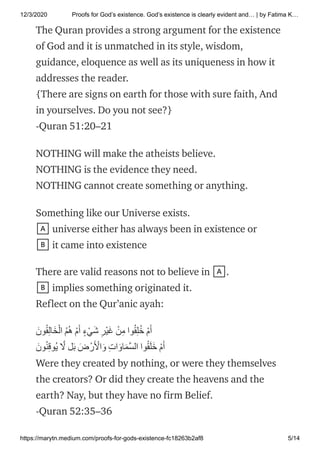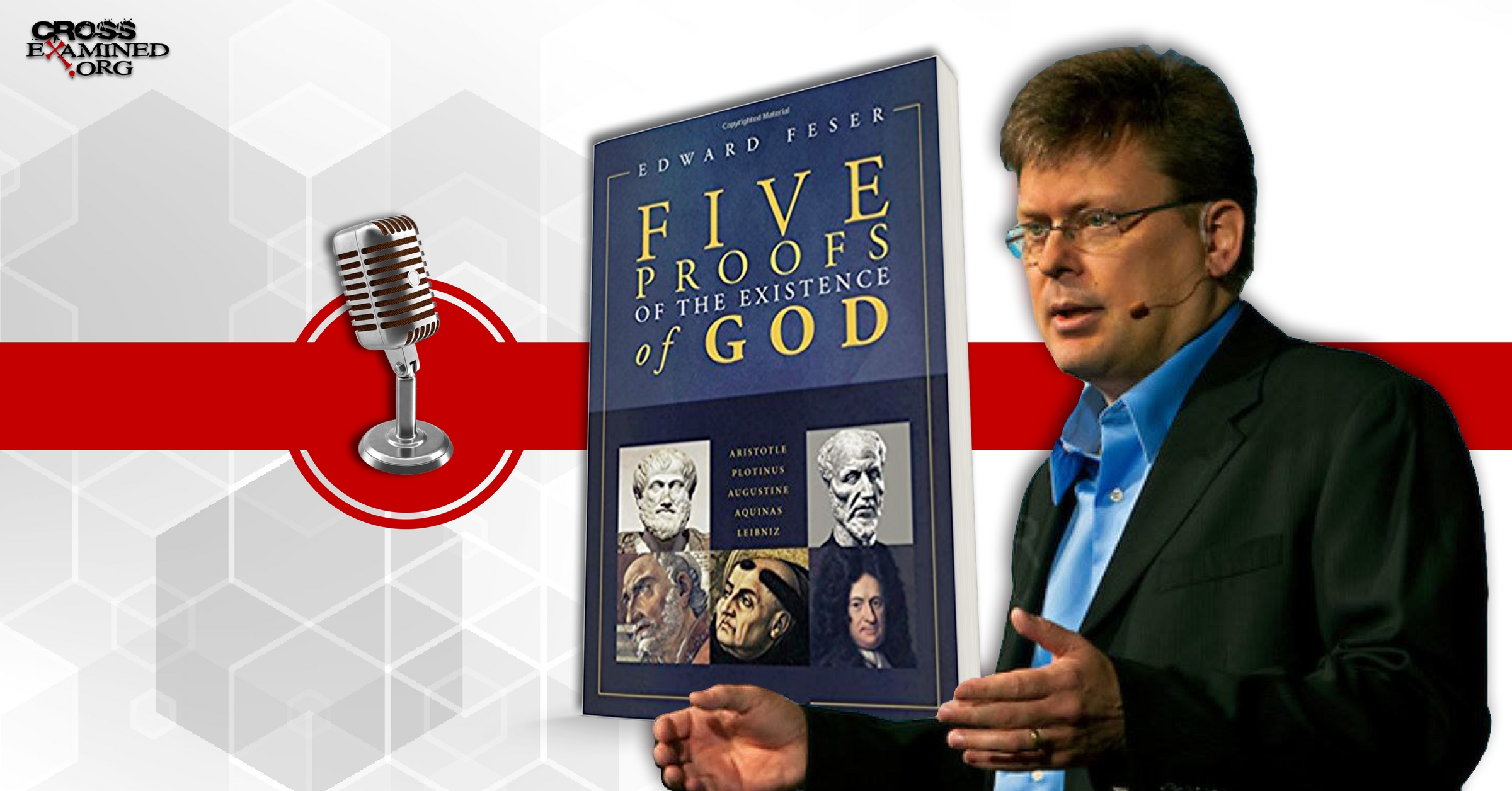Have you ever looked up at a star-studded night sky and felt a profound sense of awe, questioning your place in the vast universe? Or perhaps, during moments of deep despair, you’ve sought solace in the belief that something greater is watching over you? The question of God’s existence has captivated humanity for millennia, sparking countless debates and philosophical investigations. Today, we delve into five compelling arguments that have been put forward throughout history, attempting to provide rational support for this age-old faith.

Image: www.slideshare.net
Exploring the topic of “five proofs of the existence of God pdf” is not merely an intellectual exercise; it’s a journey into the very essence of human existence. Whether you are deeply religious, agnostic, or somewhere in between, understanding these arguments can deepen your personal understanding of faith, philosophy, and the nature of reality itself. These proofs, often referred to as “arguments for God,” are not intended to be definitive pronouncements but rather invitations to thoughtful reflection and critical engagement with the concept of a higher power.
The Cosmological Argument: First Cause and the Uncaused Cause
One of the earliest and most enduring arguments for God’s existence is the cosmological argument, which focuses on the idea of a first cause. Simply put, it proposes that every event must have a cause. If we trace back the chain of causes, we eventually arrive at a point where there must be an uncaused cause – a first cause. This uncaused cause, according to proponents of the cosmological argument, is God.
Think of a domino effect. The first domino falls, causing the next one to fall, and so on. But what made the first domino fall? The cosmological argument suggests that there must be something outside the chain of causes that initiated the whole process. This “something” is God, the ultimate source of all creation. The argument derives its strength from the intuitive understanding that everything must have a beginning.
One of the early proponents of the cosmological argument was the Greek philosopher Aristotle, who suggested that the universe must be set in motion by a “prime mover” – an eternal, uncaused first cause. In the Middle Ages, this argument was embraced by Thomas Aquinas, who saw it as a powerful defense of Christian beliefs.
While the cosmological argument remains influential, it has faced criticism from those who argue that it relies on a circular reasoning – assuming the very thing it seeks to prove. If everything must have a cause, why not apply that same logic to God? Where did God come from? Moreover, modern physics, with concepts like the big bang theory, has attempted to explain the origin of the universe without invoking a supernatural force. However, the cosmological argument continues to spark debate and conversation about the nature of reality and the possibility of a higher power.
The Teleological Argument: Order, Complexity, and Design
The teleological argument, also known as the argument from design, proposes that the intricate order and complexity of the universe points to the existence of an intelligent designer. Think about the delicate balance of our solar system, the intricate mechanisms of living organisms, or the astonishing beauty of a nebula. Could such order and complexity have arisen by chance?
Drawing inspiration from the natural world, the teleological argument suggests that the universe operates according to finely tuned laws and intricate designs that point to the work of a creator. Consider the human eye, with its complex structure that allows us to see. The intricate network of nerves, muscles, and lenses work together harmoniously to capture light and interpret the world around us. To some, the design of the eye is too complex to be purely a product of evolutionary processes. Similarly, the intricate balance of life-supporting elements on Earth, such as the oxygen atmosphere, seems too precise to be a mere coincidence.
William Paley, an influential English theologian, used the analogy of a watch to illustrate this point. If we found a watch in the forest, we wouldn’t assume it simply came to be. We would recognize it as a product of intelligent design. Similarly, Paley argued, the complexity of the universe suggests the existence of a divine watchmaker, a creator who put it all together.
However, like the cosmological argument, the teleological argument has faced significant challenges. The theory of evolution, with its explanation of complex life arising through natural selection and adaptation, has provided a naturalistic alternative to a divine designer. Critics argue that the order and complexity of the universe could simply be a result of chance, or the emergence of self-organizing systems in a vast and unpredictable universe. Despite these criticisms, the teleological argument remains a powerful and intuitive argument that continues to resonate with many people. It invites us to contemplate the universe’s wonder and to ponder whether it is simply a product of chance or a manifestation of a greater design.
The Argument from Religious Experience: Personal Encounters with the Divine
Beyond the realms of logic and philosophy, the argument from religious experience contends that the existence of God is evident through the personal experiences of countless individuals who have felt a divine presence in their lives. This argument moves beyond rational proofs and delves into the personal and subjective realm, drawing its strength from the lived experiences of believers.
Imagine a person facing a life-altering crisis, feeling lost and desperate. Then, unexpectedly, a sense of peace and unshakeable hope washes over them. They may attribute this experience to a divine intervention, a moment of personal connection with God. In these moments of deep personal transformation, believers often testify to feeling a sense of love, guidance, and purpose beyond their ordinary grasp. They may report seeing visions, hearing voices, or feeling an overwhelming sense of presence that transcends the limits of their physical senses.
The argument from religious experience acknowledges that these experiences are deeply personal and subjective, and they may be difficult to explain or validate objectively. Still, for millions of people, these experiences serve as the bedrock of their faith. They are not just theoretical concepts but lived realities, shaping their worldviews and lending a profound sense of meaning to their lives.
However, the argument from religious experience is often viewed with skepticism by those who emphasize rationality and objectivity. They may point to psychological explanations for such experiences, such as strong emotions, wishful thinking, or the influence of social conditioning. Skeptics may argue that these experiences are simply illusions or hallucinations, lacking any objective basis.
Despite these criticisms, the argument from religious experience continues to hold tremendous sway over countless believers. The depth and intensity of these personal encounters with the divine cannot be easily dismissed, and they serve as a powerful testament to the enduring power of faith.

Image: crossexamined.org
The Moral Argument: The Foundation of Good and the Search for Meaning
The moral argument for God’s existence proposes that a sense of morality – a distinction between right and wrong – cannot be fully explained without invoking the existence of a higher authority. This argument suggests that morality is not merely a matter of social convention or personal preference but rather an objective truth grounded in the character of a divine being.
Imagine a world without any inherent sense of right or wrong, where justice is merely a matter of power, and life has no intrinsic value. Would this be a just and humane world? The moral argument suggests no, because it is the inherent sense of right and wrong within us that guides our actions, gives us a sense of justice, and motivates us to strive for good. This innate moral compass points to something beyond ourselves, a source of values and principles that transcends our own limited perspectives.
For proponents of this argument, God serves as the ultimate foundation of morality, the source of eternal truths about justice, love, and compassion. God, according to this perspective, sets the standards of goodness and provides a reason for living a life of virtue. Moreover, the moral argument proposes that the existence of evil in the world further points to the necessity of a divine standard of good. Without God, how can we truly understand the injustice, suffering, and cruelty that exists in the world? How can we find meaning in the face of such evil?
The moral argument is not without its critics. Some may argue that morality is simply a product of human evolution, a social construct used to ensure the survival and well-being of the group. Others may propose that morality derives from human reason and empathy, without needing a divine source.
However, the moral argument remains compelling for many people, providing a foundation for their ethical beliefs and a sense of meaning in a world often plagued by conflict and injustice. It encourages us to reflect on the universal values that bind us together, such as compassion, fairness, and love, and to strive for a better world grounded in these principles.
The Argument from Pascal’s Wager: The Risks of Belief vs. Non-Belief
Pascal’s wager, a famous argument formulated by French mathematician and philosopher Blaise Pascal, takes a unique approach to the question of God’s existence. Rather than focusing on scientific proofs or philosophical arguments, it centers on the practical consequences of belief and non-belief. Pascal reasoned that the act of belief in God, even if it is ultimately a “gamble,” carries far greater rewards than the risk of non-belief.
Imagine two possible scenarios: A) God exists, and B) God doesn’t exist. Now consider the possible outcomes of believing or not believing. If you believe in God and God truly exists, you gain eternal salvation. But if you believe in God and God doesn’t exist, you lose nothing but perhaps some time and effort devoted to religious practice. Conversely, if you don’t believe in God and God truly exists, you face eternal damnation. But if you don’t believe in God and God doesn’t exist, you lose nothing.
Pascal’s wager suggests that the potential benefits of believing in God far outweigh the risks of non-belief. If God exists, the rewards for belief are infinite, while the consequences of non-belief are eternal. Conversely, if God doesn’t exist, the loss associated with belief is minimal compared to the potential loss associated with non-belief. While Pascal’s wager is not a philosophical proof of God’s existence, it offers a pragmatic approach to the question of faith, highlighting the practical implications of belief or non-belief.
Five Proofs Of The Existence Of God Pdf
Engaging with the Proofs: A Journey of Personal Discovery
The five proofs of the existence of God presented here represent a diverse range of perspectives, drawing upon logic, reason, religious experience, and even practical considerations. It is important to approach these arguments with an open mind, engaging in critical reflection and seeking out diverse perspectives.
Remember, these proofs are not intended to be definitive answers but rather invitations to explore the complex and enduring question of God’s existence. No single argument alone holds the key to unlocking the mysteries of faith. It is through thoughtful consideration, open dialogue, and, perhaps, a touch of personal reflection that we can embark on our own journeys of discovery and find meaning in our own understanding of the divine.
Whether or not you embrace these proofs as evidence of God’s existence, the very act of inquiring into these arguments can lead to deeper self-awareness, profound contemplation, and a greater appreciation for the complexities of our existence. The journey of faith is not always easy, but it is a journey of ongoing exploration, challenging our assumptions and enriching our understanding of ourselves and the world around us.






